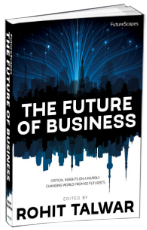09 Feb What is the future of work for kids today?
With increasing automation and robotics, as well as a hyperconnected global labor pool, the future of work frequently comes up as an issue for Homelanders or Generation Z. After the Millennials was recently commissioned by the educational non-profit Knowledge Works to do a nation-wide generational survey that assessed young people’s attitudes toward career preparation in the future. We derived some interesting findings, which will be published in The Interdisciplinary Journal of Future Studies this March.
What is really a job anyway?
Bear in mind that ‘work’ the way we think of it today stems from the labor intensive industrial models of the 19th and 20th century. Each time we experienced large scale innovations in technology or management, there were concerns that the efficiency gains would render large parts of the labor force unemployed. But humans found new areas to turn into productive activities which grew the economy even further.
As exponential changes in robotics and artificial intelligence now could leave many functions obsolete, the same concerns are rising. Moreover, since many businesses in the digital age can scale infinitely and with marginal costs approaching zero, oligopolies of large actors (think Apple, Amazon) can crowd out competitors globally.
The big question is really if the demand for human input as new services and products arise will be enough to offset the loss of jobs that will be automated or taken over by digital monopolies. World Economic Forum believes we will only acquire 2 million new jobs for the 7 million we will lose, indicating a net loss of 5 million human jobs. McKinsey moderates this stark scenario by looking deeper into the likelihood that different job or task categories will be automated in this new report.
Here are a few scenarios that could prevent mass unemployment:
- Automated job functions change rather than replace the human role. Examples: Traffic laws could prevent fully automated trucks and passenger transportation from being unmanned which means a person will have to be present although operationally redundant. IBM’s Watson does not get medical licence, meaning that despite diagnosing diseases even the best medical specialists miss, it has to be assisted by a human doctor.
- Automation creates its own new problems that have to be solved. Examples: Most legislations are not even close to having a secure IoT architecture that prevents hackers from causing unimaginable destructions between interconnected machines. We will need tons of security specialists, white hats and data scientists to advance security over the foreseeable future, so this is clearly a job growth area. We will also see new product lines and even business verticals stemming from this new dynamic, e.g. self-driving taxis will need designers, lifestyle experts and entertainers to create a whole new traveling experience.
- The gig economy replaces full employment. Close to half of all workers will be freelancers by 2020. In this new economy a good business strategy will be to fill a unique niche that is harder for big companies to take over. This is advisable for both business owners and workers. This will affect recruiting and we will see more gig-or project based work where uniquely specialized individuals trade their skills on the open market rather than as an internal employee. Think Tinder for temporary job contracts.
- Human touch will be in demand. Both cognitively advanced and routine transactional operations are easy to automate, but not jobs that depend on human interactions. Today these tend to be the least appreciated jobs, such as preschool teachers, healthcare staff, caretakers – even sex workers. All areas where EQ and human connections mean more than your SAT scores or calculus abilities. Some people will say robots will take over this area also, but I doubt it. Humans seek other humans because they can relate. A robotic assistant can adapt to, but never relate because its architecture lacks the vulnerabilities that make us human, which is ultimately the common ground that we seek in other humans.
So what will be the new jobs of the future? And how well do you think our youngest generation is prepared to help create this future?
This post was first published at Quora.


Sorry, the comment form is closed at this time.